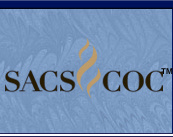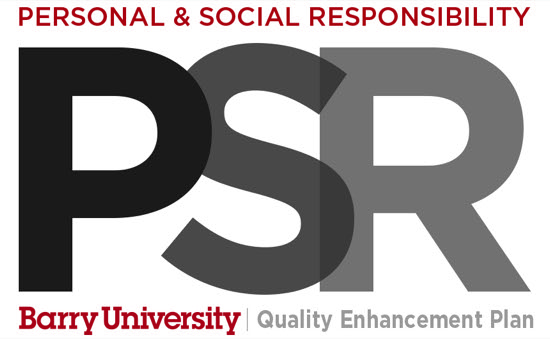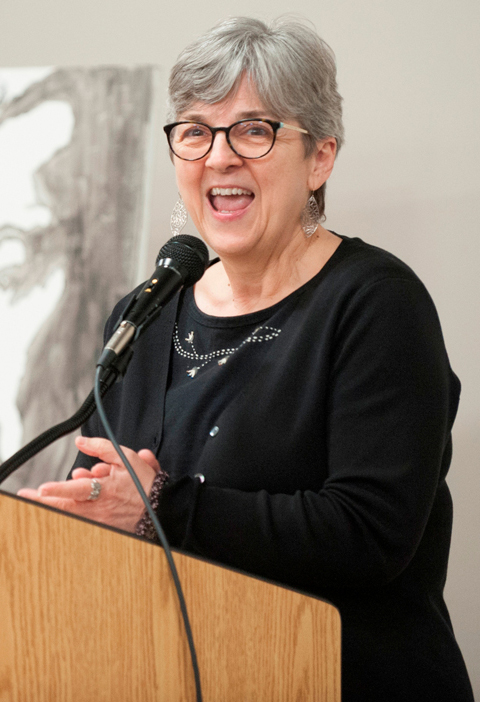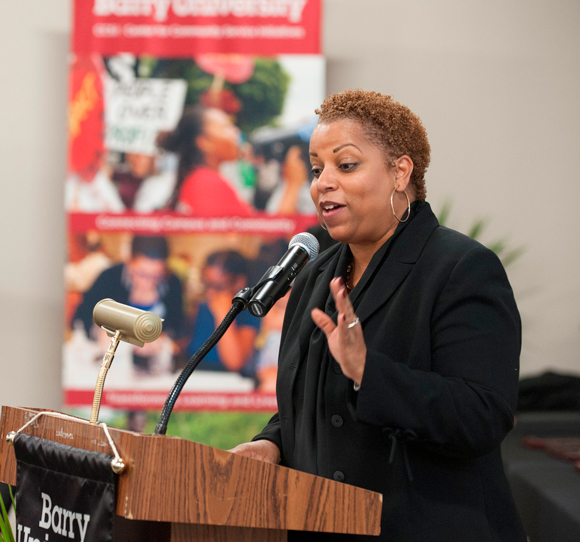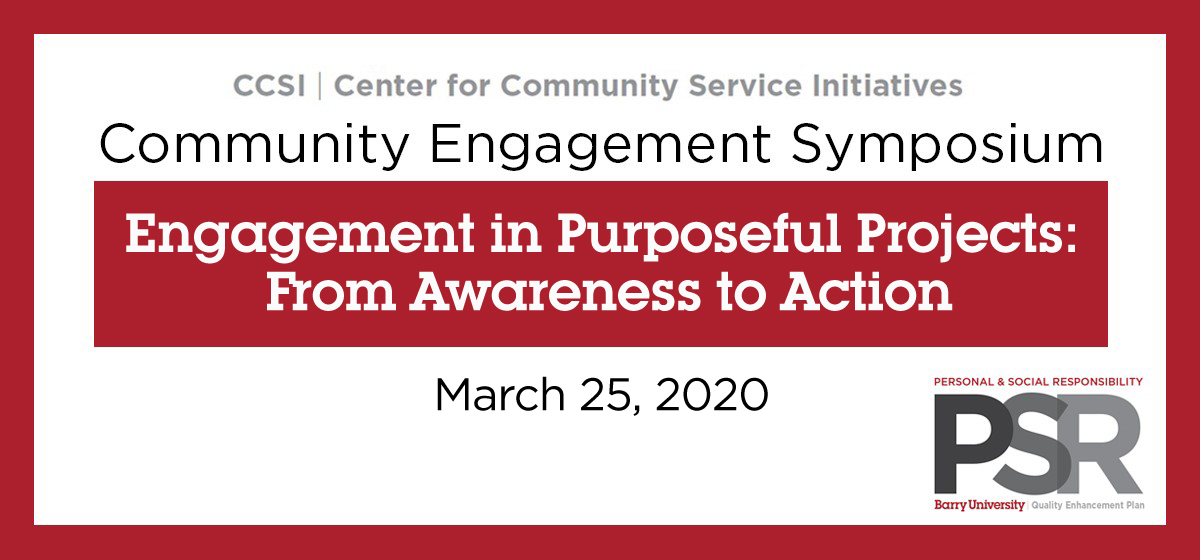|
|
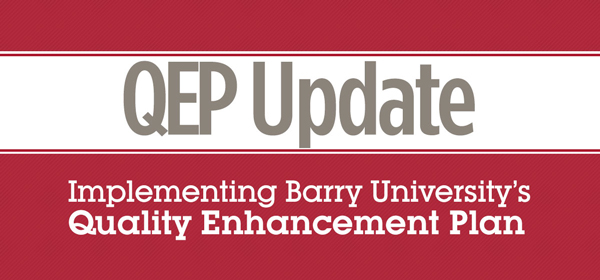
|
QEP Impact Report to be Submitted to Regional Accreditation Body in MarchBarry University will submit its Quality Enhancement Plan (QEP) Impact Report to the Southern Association of Colleges and Schools Commission on Colleges (SACSCOC) next March. The report will highlight lessons learned from the implementation of the plan. The QEP Impact Report will be part of Barry's Fifth-Year Interim Report to SACSCOC, the regional body for the accreditation of degree-granting higher education institutions in the Southern states. According to QEP Director Dr. Glenn Bowen, Part V of the Fifth-Year Interim Report will specify the QEP's impact on student learning and on the environment supporting student learning. "In it, we will reflect on what our institution has learned as a result of the QEP experience," he added.
Barry's QEP is focused on personal and social responsibility through experiential learning. The plan has two major goals: (1) To facilitate learning that cultivates academic and personal integrity, perspective consciousness, and competence in ethical and moral reasoning; (2) To provide opportunities for students to develop and demonstrate socially responsive knowledge, values, and skills through engagement and collaboration with communities. The QEP Implementation Committee is expected to review assessment results in January and a draft of the Impact Report in February. In early March, the report will be finalized for submission to the Office of the Provost. Members of the QEP Implementation Committee are Dr. Maria Alvarez (Mission and Student Engagement), Dr. Paige Banaji (English and Foreign Languages), Dr. Glenn Bowen (Center for Community Service Initiatives), Dr. Sean Buckreis (School of Education), Dr. Karen Callaghan (College of Arts and Sciences), Dr. Nichole Castater (School of Business), Dr. Pamela Hall (Psychology), Dr. Tamara Hamilton (Chemistry), Larry Perez (Mission and Student Engagement), Dr. Victor Romano (Student Success and Undergraduate Studies – ex officio), Dr. Leticia Vega (Biology), and Ashley Wright (School of Social Work). |
Number of Designated ‘PSR’ Courses Continues to GrowThe QEP Implementation Committee recently approved sections of four courses for the PSR designation. A new co-curricular program also was added to the PSR list. Biological Foundations II Lab (BIO 111L) was among the course sections approved for the PSR designation. Dr. Silvia Maciá, professor of biology, is the instructor. In addition, Genetics Laboratory (BIO 341L-L1) has replaced Introduction to Human Anatomy (BIO 220) as a PSR course. The instructor is Dr. Ana Jimenez, associate professor of biology. International Business (BUS 366) is another of the courses on the PSR list. Dr. Nichole Castater, associate professor of finance, is the instructor for this major-area course in the School of Business. The Career and Professional Development Certification Program was approved for the PSR. The goal of this program is "to provide students with opportunities to learn about career competencies and why employers find them important; to reflect on how to gain and articulate those competencies in a resume or job interview; and to serve their community while demonstrating a mastery of these competencies in internships and jobs." Career Development Center Director John Moriarty and Associate Director Shaunie Wall Marshall submitted the application for the PSR designation. All courses and co-curricular programs approved for the PSR have met the criteria for the "personal and social responsibility" designation as part of Barry's Quality Enhancement Plan (QEP). Those courses and programs intentionally emphasize elements of personal and social responsibility. Multiple-section courses include First-Year Composition and Rhetoric (ENG 111), Techniques of Research (ENG 112), and Writing about Literature (ENG 210). Course instructors include Drs. Paige Banaji, Bradley Bowers, Lawrence Byrnes, Evelyn Cartright, Andrea Greenbaum, Aimee Jones, and Ligia Mihut, as well as Christina Crossgrove. In an end-of-semester report, QEP Director Dr. Glenn Bowen noted that 75 sections of 31 courses now carry the PSR. Those numbers do not include the courses reviewed by the Service-Learning Designation Committee.
Barry's QEP is titled "Fostering Personal and Social Responsibility through Experiential Learning." The three categories of QEP learning outcomes are Ethical and Moral Reasoning, Engaging Diverse Perspectives, and Community Engagement and Collaboration. Two specific outcomes are listed in each category. Each PSR-designated course or course section addresses at least one of the six QEP learning outcomes. The complete list of PSR-designated courses is in the Resources section of the QEP website. |
||||||||||||||||||||||||||||||
Community Advisory Committee Discusses QEP Implementation Progress
Dr. Karen Callaghan, chair of the QEP Implementation Committee, reported that faculty members have been changing their teaching approach as they embed personal and social responsibility (PSR) outcomes in their courses as part of a "values-based curriculum." She added that students have been demonstrating "significant learning focused on PSR outcomes" while faculty and staff continue to develop skills in integrating such outcomes in multiple disciplines and co-curricular activities. Callaghan emphasized attention to "the common good," social justice, and critical pedagogy. She said students were being offered increased opportunities to use "experiential knowledge" and to "examine concrete connections between ideas/knowledge and what is happening in the world." Dr. Victor Romano, associate vice provost for student success and undergraduate studies, welcomed the Community Advisory Committee members to campus. In an institutional update, he outlined recent developments at Barry, including the appointment of a new president and other organizational changes. Other Barry representatives who participated in the meeting were Dr. Glenn Bowen, director of the QEP; Liz James, experiential learning coordinator; and Dr. Heather Johnson Desiral, QEP project assistant. Appointed by the provost, the Community Advisory Committee supports the implementation of Barry's Quality Enhancement Plan (QEP) and shapes institutional involvement with the community by offering suggestions and advice. Committee members share their knowledge, experience, and expertise with the university, and they also serve as liaisons to community-based entities and the wider community. Saliha Nelson, vice president of URGENT, Inc., chaired the meeting. Nelson is chair of the Advisory Committee. Other committee members who participated in the meeting were Juan J. Calvo, international partner at Baron Silver Stevens Financial Advisors; Ezra Dieuveille, CEO of Baton Youth Services; Guy Forchion, executive director of the Virginia Key Beach Park Trust; Anthony Grisby, community development administrator for the City of Hollywood; Linsey Harris Smith, area and foundations relations director at Special Olympics Florida; Roger Horne, co-founder and executive director at Urban GreenWorks; Andrea Ivory, founder and executive director of the Women's Breast and Heart Initiative; and Lynne Kunins, president and CEO of FLIPANY. |
Community Engagement Symposium Presentation Proposals to be Submitted by January 31
The Center for Community Service Initiatives (CCSI) is accepting proposals for presentations at Barry's seventh annual Community Engagement Symposium. Students as well as faculty, staff, and community partners are invited to submit proposals for presentations by January 31. The theme of the symposium is "Engagement in Purposeful Projects: From Awareness to Action." In the context of community engagement, purposeful projects include experiential learning practices such as service-learning, community-based research, fieldwork, study abroad, capstones, and internships. Proposals should address the theme of the symposium and identify the experiential learning practice that was implemented. Successful proposals will specify the course or co-curricular project, the social or community issue addressed, the related activities undertaken, and the actual learning outcomes. Proposals should also emphasize how the project was designed to be purposeful and how student awareness was translated into action. Scheduled for March 25, the 2020 symposium will highlight student learning outcomes of community engagement practices in the context of Barry's Quality Enhancement Plan (QEP) titled "Fostering Personal and Social Responsibility through Experiential Learning."
A Student Poster Competition will be a feature of the symposium. Entries will be on display during the poster session, and prizes will be presented during the closing session of the event. At the 2019 symposium, Paris Razor, a senior majoring in English, won the first prize of a 32-inch television set for her poster titled "Developing Resources for the Student/Farmworker Alliance to Engage Peers in Supporting Farmworker Rights." Shayna Ramirez, a junior majoring in biology, took home the second prize of a smart speaker for her poster, "Engaging Barry Students to Protect Florida's Wildlife: A Partnership with Pelican Harbor." For their poster, "Growing Calculus: Using Calculus to Design a Garden," mathematics students Kerri Richardson, Melody Williams, and Tracey Presume were the joint winners of wireless headphones, the third prize. Additional information on the symposium is available from the CCSI at service@barry.edu. Information on the Student Poster Competition is available from Dr. Heather Johnson Desiral, QEP project assistant, who may be reached at qep@barry.edu or 305-981-8196. |
| ©2019 Barry University. All Rights Reserved. |

